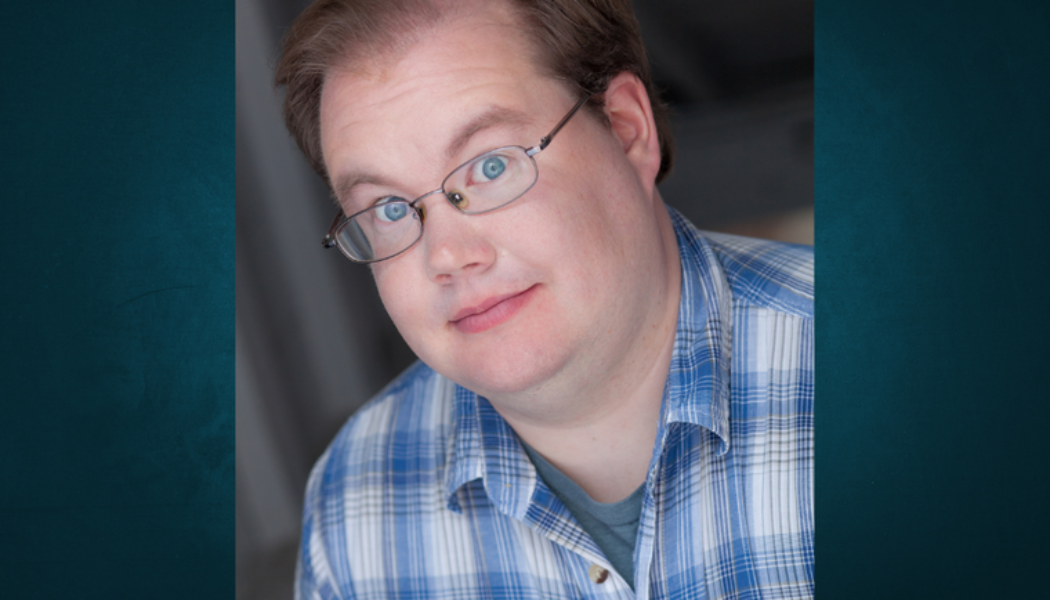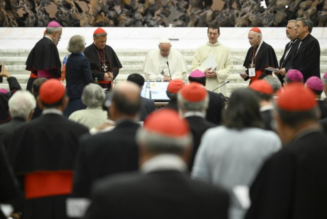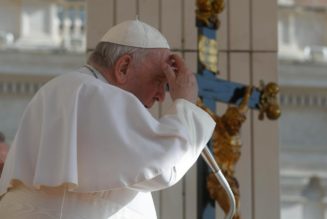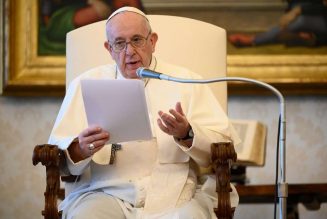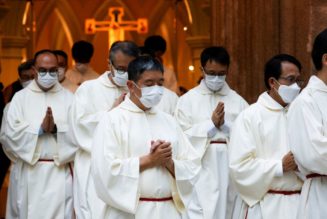
A hermit in Kentucky who publicly identified as transgender this past weekend has prompted questions about how the Catholic Church should deal with such cases in religious life given the Church’s opposition to what Pope Francis has called “gender ideology.”
The announcement has also raised questions about how the hermit, a female who identifies as a man, got religious training at a Benedictine monastery for men.
Brother Christian Matson, the hermit’s religious name, went public about Matson’s gender identity in a Religion News Service story published May 19, which was based on interviews with Matson and with Bishop John Stowe, a Conventual Franciscan who leads the Diocese of Lexington, Kentucky, where the hermit lives.
Theresa Farnan, a founding member of the Ethics and Public Policy Center’s Person and Identity Project, which provides resources to Catholic schools and dioceses about the Church’s teaching on gender identity, said Matson’s public presentation as a male hermit is problematic.
She noted that either a male or a female can live as a hermit, which is a solitary endeavor.
“However, presenting a woman religious in such a way that implies that she is a male religious clearly is giving scandal and causing disorientation to the faithful by implying that there is no conflict between our faith and the transgender lifestyle and ideology,” Farnan told the Register.
Support From Local Bishop
On Tuesday, the Diocese of Lexington published a statement on the diocese’s website:
“On Pentecost Sunday, Brother Christian Matson, a professed hermit in the Diocese of Lexington, has made it public that he is a transgender person. Brother Christian has long sought to consecrate his life to Christ in the Church by living the evangelical counsels of poverty, chastity and obedience. He has consistently been accompanied by a competent spiritual director and has undergone formation in the Benedictine tradition. He does not seek ordination, but has professed a rule of life that allows him to support himself financially by continuing his work in the arts and to live a life of contemplation in a private hermitage.”
The statement continued: “Bishop John Stowe, OFM Conv., accepted his profession and is grateful to Brother Christian for his witness of discipleship, integrity and contemplative prayer for the Church.”
The Register sought an interview with Bishop Stowe earlier this week to no avail. Matson declined comment earlier this week.
The Religion News Service story says Matson unsuccessfully tried to join several religious congregations over the course of several years, including the Jesuits. In 2020, the story says, a priest friend recommended contacting Bishop Stowe, who “wrote back immediately, expressing his openness,” the story says.
The story describes Bishop Stowe as “a leading voice among Catholics calling for a more tolerant approach to LGBTQ+ people.”
In March 2021, Bishop Stowe announced support for the Equality Act bill, proposed by Democrats in Congress, which would add “sexual orientation” and “gender identity” as protected categories in federal civil rights law. Bishop Stowe said the bill would help prevent what he called “harmful discrimination.” But the U.S. Conference of Catholic Bishops opposed the bill, saying it would threaten religious freedom and “discriminates against people of faith precisely because of those beliefs.”
In June 2021, Bishop Stowe made an appearance at an online event celebrating Pride Month, during which he offered a blessing to participants “during this annual celebration of Pride.”
In June 2022, he delivered a speech at a conference at Fordham University of Outreach, founded by Jesuit Father James Martin, which at the time had as part of its name “An LGBTQ Catholic Resource.” Bishop Stowe described what he called “hateful messages” he has received “concerning LGBT issues,” adding, “intolerance wrapped in religious garb is particularly ugly.”
In October 2023, Pope Francis’ response to a letter from five cardinals asking clarification on several doctrinal questions, including the possibility of blessing homosexual unions proposed “pastoral prudence must adequately discern if there are forms of blessing, solicited by one or various persons, that don’t transmit a mistaken concept of marriage.” Time Magazine quoted Bishop Stowe as saying of such non-matrimonial blessings: “It almost signifies God’s approval.”
Farnan told the Register that the diocese’s statement on Matson this week offers an incomplete view of Catholic teaching.
“I certainly hope that the Diocese of Lexington clarifies their statement to align with the recent DDF declaration as well as the teachings of Pope Francis,” Farnan said by email. “As it stands this statement gives a contradictory witness to the teachings of the Church by denying the unchanging reality of sexual difference and implicitly validating the false anthropology on which trans identification is based through the use of male pronouns and the use of the term Brother.”
Pope Francis has met with people who identify as transgender and has called for those who identify that way to be treated with respect and dignity. But he has also called gender theory “an ugly ideology of our time.”
Farnan noted that hermits are supposed to withdraw from the world to give praise to God through silence, penance, and prayer.
“For Matson to choose Pentecost as a day to publicly come out as transgender not only negates the gift of the body that God gives each of us at the moment of conception, but also adds to the general cultural confusion and in that way harms the salvation of the world,” Farnan said.
Him vs. Her
The use of masculine pronouns for Matson by Bishop Stowe symbolizes a conflict over how to approach people who identify with a gender that does not correspond to their biological sex.
In April, the Vatican’s Dicastery for the Doctrine of the Faith released a document called Dignitas Infinita, which rejects what it calls “gender theory” as denying “the foundational difference” between males and females.
The human body derives its dignity as the image of God “in its sexed condition,” the document states, and therefore the body, as a gift from God, must be respected as God created it. “It follows that any sex-change intervention, as a rule, risks threatening the unique dignity the person has received from the moment of conception,” the document states.
A supporter of Matson was asked this week if there might be consequences from the Vatican over Matson’s announcement.
“I would hope not,” said Stan “JR” Zerkowski, the director of the Diocese of Lexington’s LGBTQ Outreach Commission, according to the Lexington Herald Leader.
He said Matson is asking the Church “to speak a new language of love.”
“I think Brother Christian is heroic — the Church has neither spoken kindly nor been kind to transgender people, and he still views service to the Lord and to the Church as something far greater than something that would cause most people to back down. That’s heroic faith,” Zerkowski said, according to the article.
But some observers say Matson’s announcement throws down a gauntlet for the Church over whether it believes what it says about human sexuality.
John Grabowski, a moral theology professor at The Catholic University of America, said Catholic teaching “sees the body and sex as integral parts of the person,” and that struggles with what he called “gender discordance” ought to be treated, not celebrated, which he said is what publicly announcing a transgender identity suggests.
“And that, in turn raises the danger of scandal — sowing confusion in people’s minds about the Catholic understanding of the goodness of the body and its sex. And to call someone ‘brother’ who is biologically female or ‘sister’ who is biologically male deepens that confusion,” Grabowski told the Register.
“This danger of scandal is something that bishops need to be cognizant of in cases like this,” he added.
Father Thomas Petri, a Dominican moral theologian and president of the Pontifical Faculty of the Immaculate Conception in Washington D.C., said Pope Francis “has been clear in his condemnation of trans ideology,” which was confirmed by Dignitas Infinita, which condemned attempts through surgery and chemicals to change someone’s sexual identity.
“How Matson can be a hermit while, at the same time, dissenting from Church teaching in such a public way is a question that needs to be asked,” Father Petri said.
Father Petri told the Register that since a hermit is under the authority of the bishop of a diocese, and since Bishop Stowe has accepted Matson as a hermit, the situation in Lexington poses a question for the Vatican.
“Given the centralization of authority to the Holy See in recent years over certain matters such as the foundation of new institutes of consecrated life, the celebration of the 1962 Mass, and the status of apparitions, it will be interesting to see how this decision of Bishop Stowe is handled,” Father Petri said.
What Is A Hermit and Who Is Matson?
A hermit lives alone, in a type of consecrated religious life in the Catholic Church after a public profession of poverty, chastity, and obedience. A hermit is under the authority of the local bishop, and “observes a proper program of living under his direction,” according to canon law (603).
Consecrated people “strive for the perfection of charity in the service of the kingdom of God and, having been made an outstanding sign of the Church, foretell the heavenly glory,” according to canon law (573). The consecrated state of life “is neither clerical nor lay,” canon law states (588).
Matson, 39, grew up in Texas and in southeastern Virginia, according to an interview published online several years ago.
Matson studied theater and got a bachelor’s degree in fine arts from New York University, according to an article published on Medium.
Matson has extensive experience in acting and producing. Matson appeared as a poker player in Woody Allen’s 2019 movie A Rainy Day in New York, later calling it a career highlight.
Matson obtained a name change from a judge in May 2006, at age 21, from Nicole Coberly Matson to Cole Coberly Estel Matson, according to a document filed in Suffolk Circuit Court in Virginia.
Matson was raised a Presbyterian, but first engaged with Catholicism several years after the gender transition while spending a semester as a graduate student in psychology at Jesuit-run Loyola University Maryland, as Matson recounted in an interview in January 2015 on The Journey Home, a long-running hour-long interview program featuring converts to Catholicism on EWTN, which also owns the Register.
A silent eight-day retreat that included St. Ignatius of Loyola’s Spiritual Exercises intrigued Matson — what Matson called “that sort of heroic attitude to serving Christ with your whole self.”
So did reading various Catholic and Catholic-friendly authors, including C.S. Lewis, J.R.R. Tolkien, and G.K. Chesterton, as well as performing as Will Roper, St. Thomas More’s son-in-law, in a production of the play A Man For All Seasons.
“And during that production, I mean, we were talking about issues of authority, and what is it that Thomas More is taking a stand for? It’s not for Christ against non-Christians, because everybody’s a Christian. It’s a particular understanding of the unity of the Church and the authority of the Church over the temporal sphere, and also that the Church shouldn’t be split,” Matson said during the Journey Home interview.
Matson’s gender identity did not come up during the interview.
Matson became a Catholic in 2010, according to the Religion News Service story.
“I became Catholic after I transitioned because of the Catholic understanding — the sacramental understanding — of the body, of creation, of the desirability of the visible unity of the church and primarily because of the Eucharist,” Matson told Religion News Service.
Matson earned a doctorate in divinity 2016 from the Institute for Theology, Imagination, and the Arts at the University of St. Andrews in Scotland, with a dissertation on the use of Eucharistic language in three mid-20th century Polish theater companies.
How Did Matson Enter Religious Life?
In 2021, Archbishop Jerome Listecki of Milwaukee sent a memo to his fellow U.S. bishops urging them to consider requiring DNA tests or physical examinations to ensure that all seminarians are biological men.
“Recently, the Committee on Canonical Affairs and Church Governance was made aware of instances where it had been discovered that a woman living under a transgendered identity had been unknowingly admitted to the seminary or to a house of formation of an institute of consecrated life,” wrote Archbishop Listecki, then chairman of the U.S. Catholic Bishops Conference’s canonical affairs committee.
In one case, said Archbishop Listecki, “the individual’s sacramental records had been fraudulently obtained to reflect her new identity.”
“In all instances, nothing in these individuals’ medical or psychological reports had signaled past treatments or pertinent surgeries,” he added. Archbishop Listecki did not disclose any further details, other than to say that none of the biological women advanced to ordination.
Matson prepared for religious life at a Benedictine monastery for men in Rhode Island, according to a blog Matson published online.
Matson first spent time at Portsmouth Abbey Monastery, which is in Portsmouth, Rhode Island, and is affiliated with the English Benedictine Congregation, in August 2020, according to Matson’s blog. The monks live in the monastery and sponsor a grades 9-through-12 boarding school near it, Portsmouth Abbey School.
In the blog, Matson praised the food and the monks, saying “these men are a joy to be with.” The first visit included a climb to the top of the 16-story wind turbine on the property, guided by a brother.
Matson entered the novitiate at Portsmouth Abbey Monastery during Vespers on Saturday, May 1, 2021, according to Matson’s blog, which includes an image of a YouTube video that is not currently available on the abbey’s YouTube channel.
The prior of the abbey at the time, Father Michael Brunner, selected Matson’s religious name, Brother Christian, which was first on a list of three names Matson submitted, according to Matson’s blog. Matson picked the name in honor of Blessed Christian de Chergé (1937-1996), a French Trappist monk kidnapped and killed in Algeria by Islamists and beatified in 2018.
At the time, Matson expressed an interest in forming what Matson called “a private association of the faithful for artists” in the Diocese of Lexington, Kentucky, after going through religious-order training with the Benedictines.
A spokesman for the abbey this week acknowledged that Matson spent much of the year with the monks.
“Dr. Matson asked us to support him on his journey of faith and we agreed to do so for 5 months in 2021. We wish him well and have no further comment,” said Brother Sixtus, a Benedictine and subprior of the abbey, in an email message to the Register on Thursday.
In October 2021, Catholic News Agency contacted the abbey about Matson. A spokesman responded by email: “Dr. Matson was always clear that he never intended to stay at the Abbey. We have no further comment on his departure or personal circumstances.”
That same month, Father Brunner, the prior, offered more details about Matson’s stay there.
Referring to a previous email message to CNA, Father Brunner wrote: “Per my previous note, every applicant receives a thorough psychological evaluation from a licensed consultant as well as a detailed and extensive background check from a professional firm used by our lawyer. And of course they must present Baptismal and sacramental records, as well as the results of a physical examination attesting to their health. We are confident this would prevent someone entering our Abbey community who was not genuinely male. We’re not going to comment further except to say Dr. Matson went through the full process and was determined to be a biological male.”
The email message continued: “Dr. Matson only requested a temporary period of formation before going on to found a new religious community. Based on the results of his application process, we agreed to allow him to reside in the community while sharing in appropriate aspects of religious formation.
“Dr. Matson is an honorable person and came to us with excellent recommendations, despite complicated circumstances,” Father Brunner wrote, adding, “We wish him well as he continues his religious journey.”
Shannon Mullen and Christine Rouselle provided additional reporting for this story.
